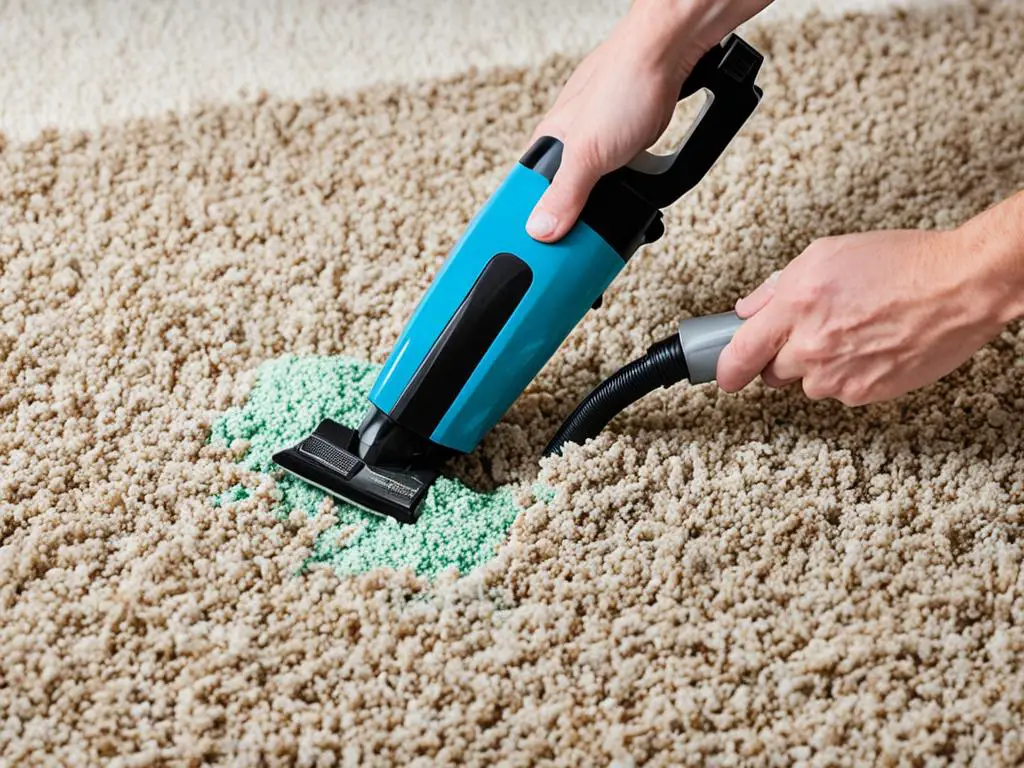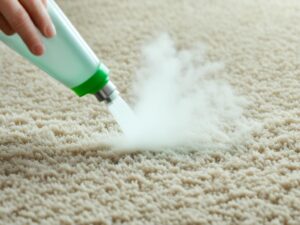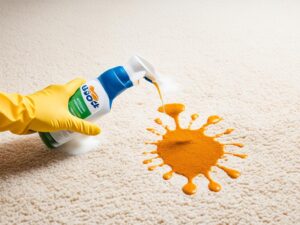Wondering how to get cat litter out of a carpet? If you own a cat, then you know how annoying it can be to deal with the trails of litter on your carpets. Cat litter often attaches to cats’ feet or gets kicked out of the litter box when they do their business. While this can be frustrating, many cat owners will tell you it is a small price to pay for the love of a cat. Luckily, this article will list some easy steps to follow to get dry or wet cat litter out of a carpet for the best results.
Key Takeaways:
- Removing cat litter from carpet can be done with a few simple steps.
- Different techniques are required for wet and dry cat litter.
- Preventative measures can help minimize cat litter messes on carpets.
- Proper cleaning solutions and tools are essential for effective cat litter cleanup.
- Removing cat litter odor from carpets requires specific cleaning methods.
How To Get Wet Cat Litter Out Of A Carpet
Dealing with wet cat litter on your carpet can be a messy and frustrating experience. But fret not, we have you covered with these simple steps to effectively remove wet cat litter from your carpet and restore its cleanliness.
- Scoop up the excess litter: Using a scoop or a paper towel, carefully scoop up as much of the wet cat litter as possible. Dispose of it in a sealed bag to prevent any odor or mess.
- Allow the wet litter to dry: Letting the remaining wet cat litter dry out is crucial for easier cleaning. Give it some time to dry naturally.
- Loosen the dried litter: Once the litter has dried, use a brush with stiff bristles to gently loosen it from the carpet fibers. Be sure to brush in all directions to effectively remove it.
- Vacuum the loosened litter: Use a vacuum cleaner to thoroughly remove the loosened litter pieces from the carpet. Go over the area multiple times to ensure all the litter is removed.
- Clean and deodorize: To eliminate any residual odor or discoloration left behind by the wet litter, clean the affected area with an enzyme cleaner or a vinegar-water solution. These solutions are effective in neutralizing odors and restoring the freshness of your carpet.
Remember, it’s important to act quickly when dealing with wet cat litter on your carpet to prevent any stains or odors from setting in. By following these steps, you can effectively remove wet cat litter and keep your carpet clean and odor-free.
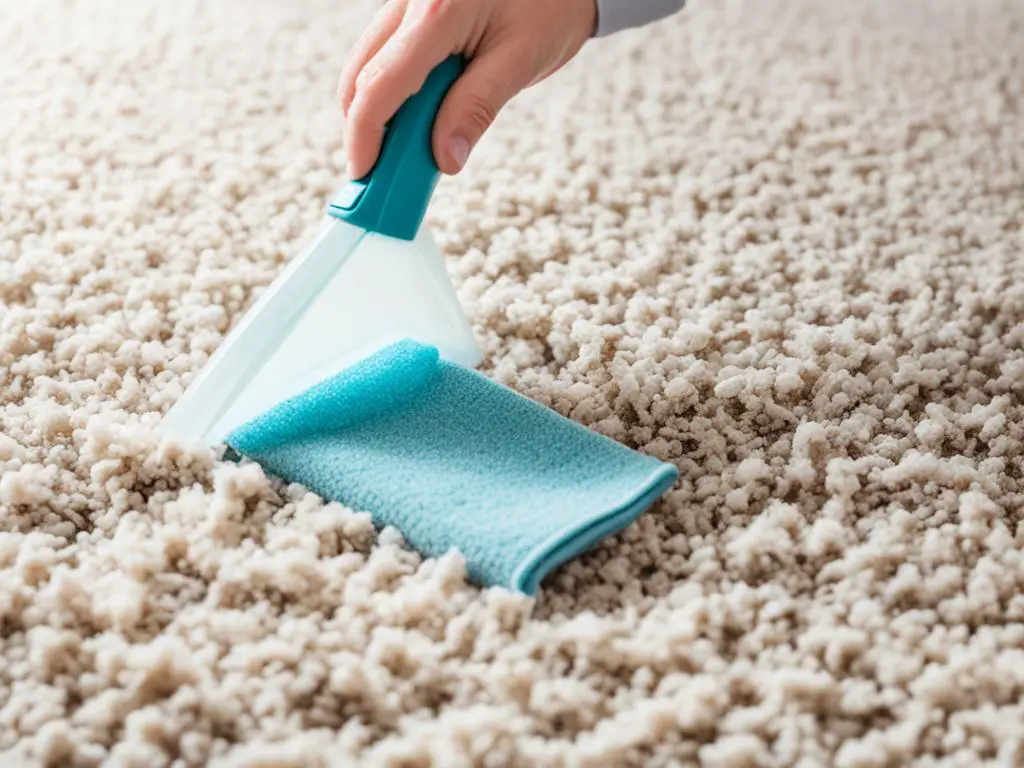
How To Get Dry Cat Litter Out Of A Carpet
Dealing with dry cat litter on your carpet? Don’t worry, we’ve got you covered. Follow these simple steps to effectively remove dry cat litter from your carpet and keep it looking pristine.
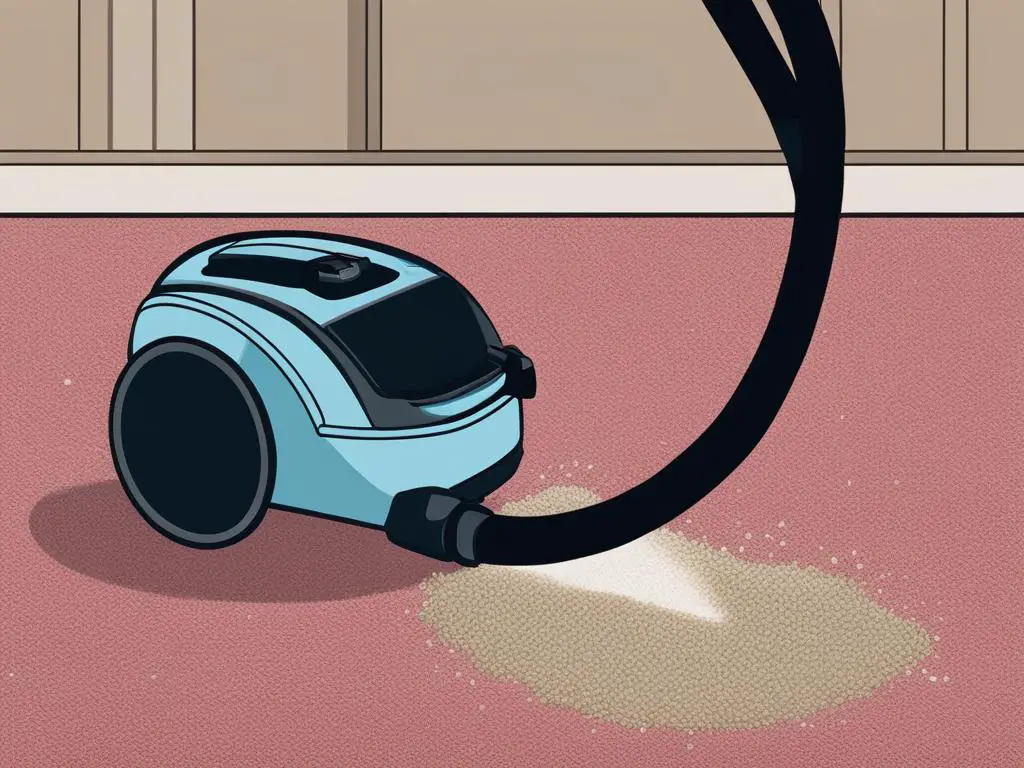
- Scoop up the dry litter: Start by scooping up as much of the dry litter as possible. Use a dustpan and brush or a paper towel for easy removal.
- Loosen the remaining litter: Next, take a brush and gently loosen the remaining litter from the carpet fibers. This will make it easier to remove.
- Soak the area (if necessary): If there are still traces of litter stuck to the carpet, you can soak the area with an enzyme cleaner or a vinegar-water solution. Allow it to sit for a few minutes to help break down the litter.
- Vacuum the loosened litter: After loosening the litter and treating the area, use a vacuum cleaner to remove the loosened litter pieces. Make sure to go over the area thoroughly.
- Wash the area: Lastly, wash the cleaned area with a carpet-safe odor-neutralizing enzyme treatment or a vinegar-water solution. This will help remove any residual odor or discoloration left behind by the dry litter.
By following these steps, you can effectively remove dry cat litter from your carpet, leaving it fresh and clean. Remember to always address cat litter spills promptly to prevent any potential damage to your carpet.
How To Get Cat Litter Out Of A Carpet Without A Vacuum
If you find yourself in a situation where you need to remove cat litter from your carpet but don’t have a vacuum on hand, don’t worry! There are still effective methods you can use to clean up the mess. Follow these simple steps:
- Sweep up the litter: Start by using a dustpan or scoop to gather as much cat litter as possible. Be thorough and make sure to collect all visible litter.
- Loosen the remaining litter: Use a brush to gently loosen the remaining litter from the carpet fibers. If there are any stubborn bits and pieces, you can use sticky tape to pick them up.
- Steam the area: To remove any stubborn pieces of litter that might be stuck to the carpet, steam the affected area. This will help loosen the litter, making it easier to remove. You can use a handheld steamer or even a clothes iron with steam setting. Just be sure to protect your hands and follow the manufacturer’s instructions.
- Thoroughly clean the area: After steaming, use your hands, a paper towel, or sticky tape to remove the loosened litter. Then, wash the area with a carpet-safe odor-neutralizing enzyme treatment or a vinegar-water solution. This will ensure that the carpet is thoroughly cleaned and any residual odor is eliminated.
By following these steps, you can effectively get cat litter out of a carpet even without a vacuum. Remember to be gentle when brushing or steaming to avoid damaging the carpet fibers. With a little effort, your carpet will be clean and litter-free!
For a visual reference, here’s an image to guide you:
Tips To Prevent Cat Litter From Damaging Your Carpet
Protecting your carpet from cat litter can save you time and effort in cleaning up messes. Follow these tips to prevent cat litter from damaging your carpet and keep it clean and fresh.
1. Placement of the Cat Litter Box
Place the cat litter box as far away from the carpeted areas as possible to minimize the chances of litter being tracked onto the carpet. Choose a location that is easily accessible to your cat but far enough from your carpet to prevent litter spills.
2. Use Cat Litter Box Lids
Consider using cat litter box lids to contain the litter and prevent it from being kicked out of the box. The lid will help minimize litter scatter and keep it confined to the box, protecting your carpet from unnecessary messes.
3. Use Plastic or Cardboard Under the Litter Box
Place a plastic or cardboard mat under the litter box to catch any stray litter that may escape the box. This will prevent the litter from directly touching the carpet and provide an additional barrier of protection.
4. Regularly Clean the Litter Box and Your Cat’s Paws
Regularly cleaning the litter box will help prevent litter buildup and reduce the chances of litter being tracked onto the carpet. Scoop the litter box daily and change the litter as needed. Additionally, periodically clean your cat’s paws to remove any clinging litter before they walk on the carpeted areas.
5. Use Cat Litter Mats
Consider using cat litter mats placed outside the litter box to capture any excess litter on your cat’s paws before they have a chance to reach the carpet. These mats have textured surfaces that help trap and collect litter, preventing it from spreading onto your carpet.
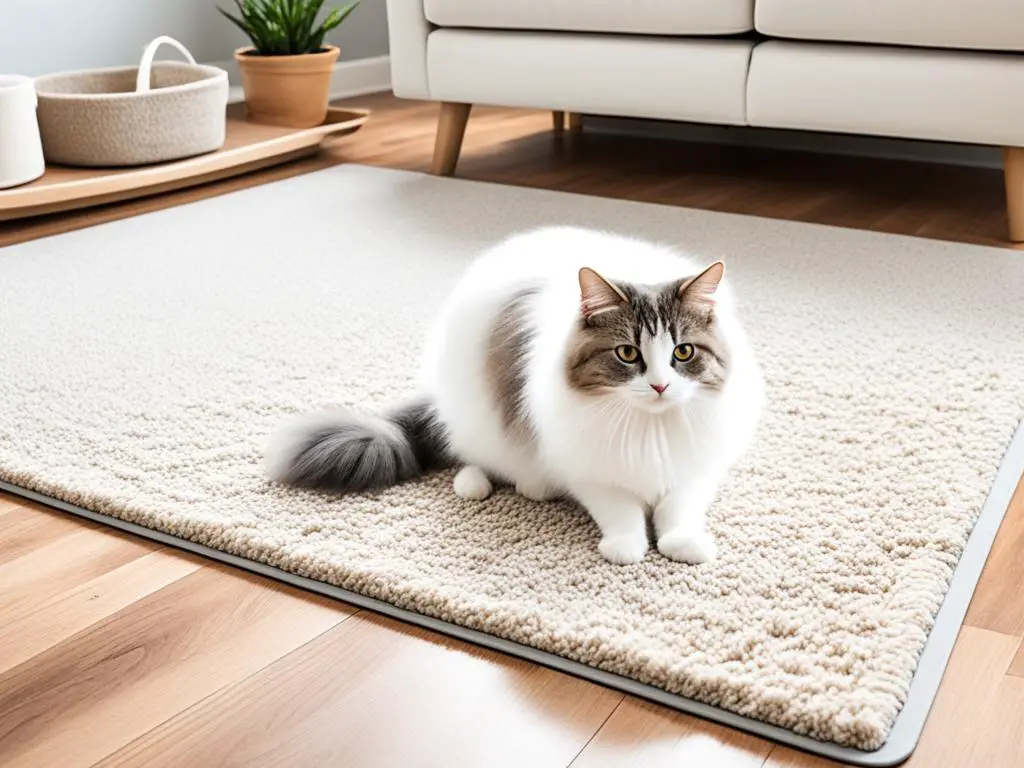
By implementing these tips, you can effectively prevent cat litter from damaging your carpet and maintain a clean and hygienic environment for both you and your furry friend. Keeping your carpet litter-free will not only prolong its lifespan but also contribute to a healthier and more pleasant living space.
How To Remove Cat Litter Odor From Carpet
Tired of dealing with the unpleasant smell of cat litter in your carpet? Don’t worry, we’ve got you covered. Follow these simple steps to eliminate cat litter odor and keep your carpet smelling fresh and clean.
1. Homemade Carpet Cleaner
To start, create a homemade carpet cleaner using ingredients you probably already have at home. Mix equal parts white vinegar and warm water in a spray bottle. Add a few drops of zoflora for a fresh scent. This mixture is highly effective in neutralizing cat litter odor.
2. Deodorize with Baking Soda
After applying the homemade cleaner, sprinkle baking soda liberally over the affected area. Baking soda works wonders in absorbing and neutralizing odors. Leave the baking soda on the carpet for at least 15 minutes before vacuuming it up.
3. Steam Cleaning
If the cat litter odor persists, consider steam cleaning the carpet. The high temperature of the steam helps to break down and eliminate stubborn odors. Make sure to follow the manufacturer’s instructions when using a steam cleaner on your carpet.
4. Enzyme Cleaner
If all else fails, consider using an enzyme cleaner specifically designed to eliminate biological odors. These cleaners contain enzymes that break down odor-causing bacteria, effectively eliminating cat litter odor from your carpet.
Remember, prevention is key to keeping your carpet odor-free. Regularly clean your cat’s litter box and paws to minimize the amount of litter that gets tracked onto the carpet. Using litter mats can also help capture excess litter before it reaches the carpet.
With these tips, you can say goodbye to cat litter odor and enjoy a fresh-smelling carpet once again.
| Method | Effectiveness |
|---|---|
| Homemade Carpet Cleaner | Highly effective |
| Baking Soda | Great for deodorizing |
| Steam Cleaning | Effective for stubborn odors |
| Enzyme Cleaner | Powerful odor elimination |
Conclusion
Cleaning up cat litter from carpets can be a hassle, but with the right steps and tools, it can be easily done. Whether dealing with wet or dry litter, using a vacuum, brush, and appropriate cleaning solutions can effectively remove litter and prevent lingering odors.
Taking preventative measures, such as proper litter box placement and regular cleaning, can also help minimize litter messes on carpets. By placing the litter box as far away from the carpet as possible and using cat litter box lids or protective mats, you can contain the litter and prevent it from spreading onto your carpets.
With these simple tips, you can keep your carpets clean and odor-free, even with a cat in the house. Remember to scoop up any litter spills promptly, use a brush to loosen any embedded litter, and clean the affected area with an enzyme cleaner or a vinegar-water solution to ensure a deep clean.
So, don’t let cat litter ruin the beauty of your carpets. Take action, follow these guidelines, and enjoy a clean and fresh-smelling home for both you and your feline friend.
